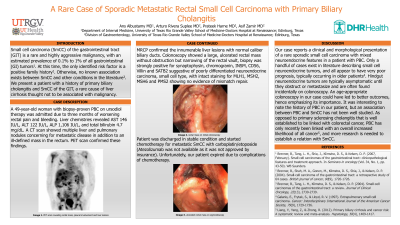Back


Poster Session E - Tuesday Afternoon
Category: Colon
E0150 - A Rare Case of Sporadic Metastatic Rectal Small Cell Carcinoma With Primary Biliary Cholangitis
Tuesday, October 25, 2022
3:00 PM – 5:00 PM ET
Location: Crown Ballroom

Has Audio

Ans Albustamy, MD
University of Texas Rio Grande Valley at Doctors Hospital at Renaissance
Edinburg, TX
Presenting Author(s)
Ans Albustamy, MD, Arturo Suplee Rivera, MD, Prateek S. Harne, MBBS, MD, Asif Zamir, MD, FACG
University of Texas Rio Grande Valley at Doctors Hospital at Renaissance, Edinburg, TX
Introduction: Small cell carcinoma (SmCC) of the gastrointestinal (GI) tract is a rare and highly aggressive malignancy with an estimated prevalence of 0.1% to 1% of all GI tumors. The only known risk factor is a positive family history with no other known associations between SmCC and other conditions in the literature. We present a rare case of a metastasized sporadic mixed neuroendocrine-small cell rectal carcinoma in a patient with primary biliary cholangitis (PBC).
Case Description/Methods: A 49-year-old woman with biopsy-proven PBC on ursodiol therapy was admitted due to three months of worsening rectal pain and bleeding. Liver chemistries revealed AST 146 IU/L, ALT 122 IU/L, ALP 1,106 IU/L, and total bilirubin 4.7 mg/dL. A CT scan showed multiple liver and pulmonary nodules concerning for metastatic disease in addition to an ill-defined mass in the rectum. MRCP confirmed the innumerable liver lesions with normal caliber biliary ducts. Colonoscopy showed a large, ulcerated rectal mass without obstruction but narrowing of the rectal vault (Image 1), biopsy was strongly positive for synaptophysin, chromogranin, INSM, CD56, Villin and SATB2 suggestive of poorly differentiated neuroendocrine carcinoma, small cell type, with intact staining for MLH1, MSH2, MSH6 and PMS2 showing no evidence of mismatch repair. Patient was discharged in stable condition and started chemotherapy for metastatic SmCC with carboplatin/etoposide (Atezolizumab not approved by insurance). Unfortunately, patient expired due to complications of chemotherapy.
Discussion: Our case reports a clinical and morphological presentation of a rare sporadic small cell carcinoma with mixed neuroendocrine features in a patient with PBC. Only a handful of cases exist in literature describing small cell neuroendocrine tumors, and all appear to have very poor prognosis, typically occurring in older patients. Hindgut neuroendocrine tumors are typically asymptomatic until they obstruct or metastasize and are often found incidentally on colonoscopy. An age-appropriate colonoscopy in our case could have led to better outcomes, hence emphasizing its importance. It was interesting to note the history of PBC in our patient, but an association between PBC and SmCC has not been well studied and more research is needed to establish a relation.

Disclosures:
Ans Albustamy, MD, Arturo Suplee Rivera, MD, Prateek S. Harne, MBBS, MD, Asif Zamir, MD, FACG. E0150 - A Rare Case of Sporadic Metastatic Rectal Small Cell Carcinoma With Primary Biliary Cholangitis, ACG 2022 Annual Scientific Meeting Abstracts. Charlotte, NC: American College of Gastroenterology.
University of Texas Rio Grande Valley at Doctors Hospital at Renaissance, Edinburg, TX
Introduction: Small cell carcinoma (SmCC) of the gastrointestinal (GI) tract is a rare and highly aggressive malignancy with an estimated prevalence of 0.1% to 1% of all GI tumors. The only known risk factor is a positive family history with no other known associations between SmCC and other conditions in the literature. We present a rare case of a metastasized sporadic mixed neuroendocrine-small cell rectal carcinoma in a patient with primary biliary cholangitis (PBC).
Case Description/Methods: A 49-year-old woman with biopsy-proven PBC on ursodiol therapy was admitted due to three months of worsening rectal pain and bleeding. Liver chemistries revealed AST 146 IU/L, ALT 122 IU/L, ALP 1,106 IU/L, and total bilirubin 4.7 mg/dL. A CT scan showed multiple liver and pulmonary nodules concerning for metastatic disease in addition to an ill-defined mass in the rectum. MRCP confirmed the innumerable liver lesions with normal caliber biliary ducts. Colonoscopy showed a large, ulcerated rectal mass without obstruction but narrowing of the rectal vault (Image 1), biopsy was strongly positive for synaptophysin, chromogranin, INSM, CD56, Villin and SATB2 suggestive of poorly differentiated neuroendocrine carcinoma, small cell type, with intact staining for MLH1, MSH2, MSH6 and PMS2 showing no evidence of mismatch repair. Patient was discharged in stable condition and started chemotherapy for metastatic SmCC with carboplatin/etoposide (Atezolizumab not approved by insurance). Unfortunately, patient expired due to complications of chemotherapy.
Discussion: Our case reports a clinical and morphological presentation of a rare sporadic small cell carcinoma with mixed neuroendocrine features in a patient with PBC. Only a handful of cases exist in literature describing small cell neuroendocrine tumors, and all appear to have very poor prognosis, typically occurring in older patients. Hindgut neuroendocrine tumors are typically asymptomatic until they obstruct or metastasize and are often found incidentally on colonoscopy. An age-appropriate colonoscopy in our case could have led to better outcomes, hence emphasizing its importance. It was interesting to note the history of PBC in our patient, but an association between PBC and SmCC has not been well studied and more research is needed to establish a relation.

Figure: A) large, ulcerated rectal mass without obstruction, B) H&E stain, C) biopsy stained for synaptophysin
Disclosures:
Ans Albustamy indicated no relevant financial relationships.
Arturo Suplee Rivera indicated no relevant financial relationships.
Prateek Harne indicated no relevant financial relationships.
Asif Zamir indicated no relevant financial relationships.
Ans Albustamy, MD, Arturo Suplee Rivera, MD, Prateek S. Harne, MBBS, MD, Asif Zamir, MD, FACG. E0150 - A Rare Case of Sporadic Metastatic Rectal Small Cell Carcinoma With Primary Biliary Cholangitis, ACG 2022 Annual Scientific Meeting Abstracts. Charlotte, NC: American College of Gastroenterology.
